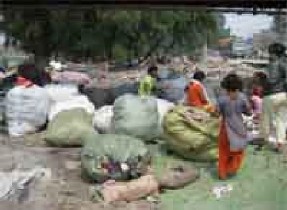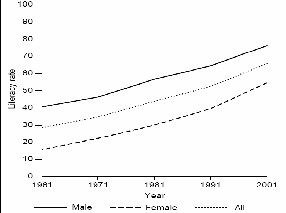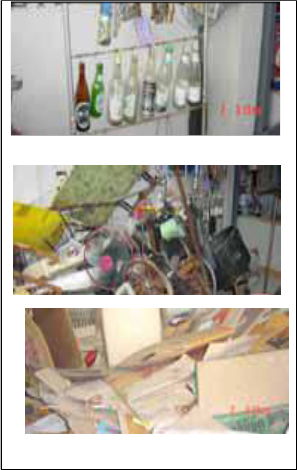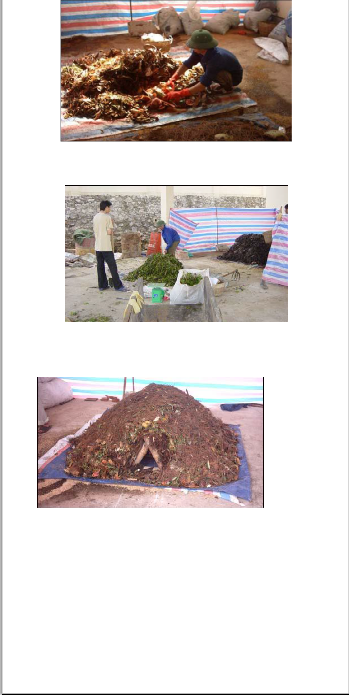International Journal of Scientific & Engineering Research Volume 2, Issue 8, August-2011 1
ISSN 2229-5518
An innovative step towards women’s empowerment by Successful Community Based Garbage bank project to protect environment
Archana gupta
Abstract- Though the Constitution of India guarantees equality of all citizens' before the law still women carry the burden of centurie s of subordination there by making it difficult for them to realize their constitutional rights. The State Government of Rajasthan itself expressed this starkly in its report of 1999: The status of women in Rajasthan is an international issue. Patriarchy, discriminatory customs and values, caste based discrimination, high illiteracy and high rates of poverty seem pervasive. Despite all efforts towards social justice, women continue to be perceived as burdens. Women and men have gender-differentiated roles and responsibilities: traditionally, men ‘work’ while women bear and rear children, and provide for the general care and maintenance of the family. As a nation, we are of course over cruel inhuman practices such as sati and other logic less
'customs' that were traditionally followed in ancient India. In Rajasthan, women are still expected to respond to reproductive work while they also have to take part in family earning. . The Urban Management Programme (UMP) (1999) Asia News reported that about 35% of the urban populations in Asian
developing countries do not have access to adequate sanitation. A significant amount of solid waste generated in urban areas were facing environmental problem caused by many reasons such as poor sanitation due to lack of knowledge, unawareness and lack of /insufficient water supply. Garbage
problem is one of the environment problems. The household waste is not affecting the household only but it also affects the community as a whole. Thus household waste is highly involved in the daily life of women. So we have to think with the increasing emphasis that to resettlement communities in
the outskirts of every area in the all villages towns and cities of Rajasthan. The environment in the slum areas might be one of the main factors to cause
their ignorance toward garbage. However, to solve this problem is a challenging. Women can display active participation in all implementation steps of any project in the community. Women are powerful agents of change, as well as innovators in response to environmental changes . Women’s responsibilities in households, communities, and as stewards of natural resources, position them well to develop strategies for adapting to changing environmental realities. The garbage bank activity is an effective awareness-raising scheme to make people realize the economic value of waste. Returns from waste trading with the bank can be an incentive for people to pursue waste separation and collection. However, since such programmes are mostly conducted in low-income communities, the effectiveness of the practice for other target groups seems questionable, as economic returns may not be an attractive incentive for them. As women represent the nucleus of the community, therefore this Garbage bank Programs gives financial independence and better quality of lifestyle to them. Healthy women produce healthy family, and lead to healthy Community.
Keywords- Environmental awareness, Garbage bank activity, MSW- Municipal solid waste, UMP-urban management programme, Women’s
empowerment,
—————————— ——————————
Introduction:-
ajasthan is the largest state of the India with 3.42 lack square kilometer of area. In the given geographic conditions and historical reasons in the feudal society
of Rajasthan, education, particularly of the girls, remained a
neglected area. Though girls are considered the squandered
gift and precious human beings with enormous potential, still traditionally, they are the last to have their basic needs and the first to be denied to the basic rights.

Archana Gupta is currently pursuing Doctor of Philosophy, in Mathematics, (Faculty of science), University of Rajasthan, Jaipur, India PH-01413931716. E-mail:archanaguptamath@gmail.com
Raising awareness on health prevention and promotion, to improve and reinforce women education‟s quality, is a must in order to ameliorate the health situation. At a worldwide level, there is a growing awareness of the need to make women contribute to the identification of environmental problems as well as in the planning of activities geared at the sustainable development of their communities. Unless new policies are set in place, this situation could have devastating implications for human development. Significant among the possible options are massive campaigns, both at government and private levels, educating people about how critical the situation is for human survival and for everybody's quality of life. In this context, women and children can be very active participants in the defense of the environment and stop, or even reverse, the degradation of our natural resources. In the low-income communities, people see financial problem as their major problem while outsiders might have a first negative impression of the community environment. In a similar way, „garbage‟ means something to be eliminated but for garbage pickers, it means their major or extra source of income. As Poerbo (1996) stated that in the informal sector approach, urban waste is viewed as an economic
IJSER © 2011
http://www.ijser.org
International Journal of Scientific & Engineering Research Volume 2, Issue 8, August-2011 2
ISSN 2229-5518
resource, which reveals multiple results like reduction of waste, saving in public expenditures for waste management, and employment generation. Garbage pickers especially women‟s live among garbage (Figure 1). They do not feel solid waste as an environmental problem. It might be impossible to make them realize environmental problems caused by „solid waste‟. Thus the community leaders come to forward together with the idea of Garbage bank which makes solid waste a source of income/money as the first step of solving environment problem. In this way, environmental problems, both at the family and community level, could be solved indirectly as well as the economic problem. Women are traditional protectors of the environment. A world survey on public attitudes on the environment sponsored by the United Nations Environment Program showed that women, when compared with men, are more likely to choose a lower standard of living with fewer health risks rather than a higher standard of living with more health risks. The Platform for Action, adopted by the Fourth World Conference on Women in Beijing in 1995, identified the need to involve women more actively in environmental decision making at all levels as well as to incorporate the gender perspective in all strategies leading to sustainable development. In that regard, this garbage bank should be run by women because, women have better access to local environmental issues and how to approach them than men. Women have often had a leadership role in reducing unnecessary use of resources, promoting an environmental ethic, and recycling resources to minimize waste. There is growing evidence that women in several countries around the world are taking central roles in the grass-roots environmental movement. And there is increasing belief that development policies that do not involve women and men alike will not be successful in the long run.

Fig. 1: A Family living with garbage due to illiteracy Without
Thinking about their family health

Fig.2: Literacy rates, by gender, 1961-2001
Source: Census of India
Some facts on the Municipal Solid Waste:-
India‟s Population As per 2001 Census is 1027 Million. India produces approximate 42.0 million tons of municipal solid waste annually at present. Yearly increase in waste generation is around 5% annually. This is a very imposing land demand, in a land- scarce India. Despite the fact that the urban local bodies utilize major part of its staff and resources for collection and disposal of MSW, nearly half of MSW generated remains unattended in many cities. Out of the funds spent on MSW management, ULBs typically spend about 65% funds on collection, 30% on transportation and a mere 5% on waste disposal. There is thus an urgent need to address the problem with a more scientific approach than the commonly adopted; crude dumping of MSW.Inspite of lots of expenditure, maximum urban bodies are failed to keep their city clean. Garbage bank can play significant role in national progress by minimizing quantity of waste for crude dumping.
Proposed new concept of “Garbage Bank Project”:-
We have to realize the environmental problem and our state government should think about the Garbage Bank Project with the concept of making cash from the trash, as well as create a clean community. The project aims to provide knowledge on garbage recycling and create awareness of housewives on household/community cleanliness. Initially we try to implement it at small scale then proceed at state and National level also with the help of communities, Gram panchayat, Nagar Nigams, States and central government.
Objectives:-
To induce participation by women‟s in community
development.
To raise environmental awareness in community
members, particularly women‟s and youth groups.
IJSER © 2011
http://www.ijser.org
International Journal of Scientific & Engineering Research Volume 2, Issue 8, August-2011 3
ISSN 2229-5518
To promote co-operation among the networks this would lead to exchanges of recyclable materials, and vegetable waste.
To generate ideas and methods for problem-
solving for challenges this may arise within each community.
To increase the female literacy rate because
literacy rate of female is very less as compared with male literacy rate.
Minimize unproductive time.
Collect materials as quickly as possible.

Fig:3 Product made from household waste

Fig. 4: Women empowerment
Initial steps taken by Community people:-
Some community committee members should undertake initiatives to establish the Garbage Bank as a project in the beginning. The general objective should be to create a good environment and to provide alternative ways of income for poor and illiterate women. The specific steps are: Firstly, to provide knowledge on household waste management as well as to make them realize the value of household waste. Secondly, it is to buy household wastes from the community members especially the housewives. Thirdly it
is to provide training/workshop related to recycling of the household wastes. In addition, the Garbage Bank also creates jobs for some people in the community as the committee employed full-time workers for this project.
Working process to run Garbage bank:-
The Garbage Bank should provide knowledge and help women‟s to realize the value of all kind of household waste. Some of the waste can be sold to the Garbage Bank while some others waste can be recycled or reused. The household wastes, which can be sold to the bank, are used plastic wares, glass wares, tins, plastic bags, paper boxes, paper and other similar recyclables as well as vegetable waste. The Garbage Bank is the place where women sell their household trash and it is to run by women of the community The Garbage Banks‟ members in each community are composed of average of eleven persons, out of which ten people, who have established the project in each community and have the share for investment, and they also involve in project management, and one is act as a supervisor to look after the related activities. They also employed some of their group members to work as full- time workers, who stand by at their bank for buying household recyclables from community members. The Garbage Bank acts as a middleman buying household wastes from the community members and sells to different recycle industries based on household wastes. The Garbage bank needs revolving fund as well as a large warehouse. However, all community members especially women and children join this project by selling segregated garbage to the bank. In exchange for bringing waste to the garbage bank, each woman receives a savings „passbook‟ to record their earnings, much like a standard savings account. The bank‟s committee member encourage the peoples of the community in such a way that more and more women‟s should participate in the project to earn some extra income under this scheme and these members are also responsible for planning, implementing and inspecting varies aspects of locality development. This committee plays a significant role in the city‟s solid waste management system. General environmental awareness and health risk due to deficient solid waste management are important factor which need to be continuously communicated by this committee to all sectors of the population. Municipal authority also appointed an officer on “special duty” and provides a platform for exchange and communication with this committee. NGO also play very important role to provide rag pickers and also trained them for composting vegetable waste at community level. Although it provide extra income for the family‟s daily meals (in case of housewives) and it helps children from poor family to earn money for their nourished food. Peoples also appreciate to see their community become clean from the successful implementation of the Garbage Bank Project. There was no garbage on the roads because people would want to pick
IJSER © 2011
http://www.ijser.org
International Journal of Scientific & Engineering Research Volume 2, Issue 8, August-2011 4
ISSN 2229-5518
them and sell as it has value for them now. Housewives understand the value of their household waste and found that aside from having more income by selling household waste, it makes their houses also cleaner. Community women leaders encouraged other housewives to produce an Effective Micro-organism (E.M.) and fertilizers from household waste such as rind and waste vegetables. Aside from decreasing the household waste, women are also able to economize. The committee further expands their project by arranging workshop on the techniques of producing E.M., which can produce washing shampoo aside from using E.M. for fertilizers and adjusting water in the drainage only the garbage bank system also allows for the viability of small-scale suppliers of recyclable wastes to be potentially linked with the markets.
Raised Awareness and Changing Perceptions:-
An important aspect in order to change norms, attitudes, and behaviors is naturally to raise the public‟s level of Awareness, informs, and trigger debates about issues such as production and consumption Patterns, actor responsibilities, sustainable economic growth. It is central that waste is understood and discussed as part of a cyclical process of production, consumption, and recovery. Another project objective is to remove the social stigmas and taboos surrounding waste; instead of perceiving waste as something dirty, it should be seen as a lucrative resource from which one could make a living. By offering competitive salaries, good working conditions, professional uniforms, and etcetera, to the employees, we hope to change negative perceptions surrounding waste. Good working conditions, continuous training, and the adoption of scientific and professional ways of handling waste will minimize health risks and other occupational hazards that are common in the informal settings.
Women empowerment through the garbage bank:-
Various socio-economic indices such as representation in workforce, type of work, income, literacy, health, and mortality reveal that woman are one of the most disadvantaged population groups. The position of woman in India compared to other countries is poor. In some villages they are considering woman as a kitchen bee. This type of attitude has to be changed. But compared to the early days, these days' women are coming out freely and participating in every field. This is a good sign. The project aims at empowering women, and in particular women from socially and economically disadvantaged groups, as well as individuals from underprivileged and people living with disabilities, by offering them continuous employment and a guaranteed salary. In order not to disregard those already involved in SWM in the informal sector (the so- called rag pickers), they will get first priority in the employment process. There will also be opportunities for the start-up of micro-enterprises in recycling. In order to make long-term, sustainable changes, people at the

grassroots level must feel Ownership of and commitment to all of the project interventions. From the experiences of Garbage Bank committee, women‟s leader realized the need of dealing with the stakeholder. They planned to negotiate for employing workers in the Garbage Bank. In this way, it would create job for poor and illiterate women‟s.
Fig. 5:Collected Recyclable material
Environmental Awareness:-
Awareness raising and capacity building regarding waste separation and collection is one of the key factors. The woman‟s committee—the core team—should joined study trips to visit other communities Conducting good practices in waste management, the project provides information and knowledge on types of waste to be separated and collected accordingly. The learning process has been re-enforced naturally through the garbage bank‟s activities, in which participants develop skills and awareness concerning waste separation, recycling and composting. The Garbage bank provide raw materials to employee (it takes about two months to produce E.M.) while they brought their own containers. They intend to produce washing shampoo to sell in their community cooperative shop. This way women‟s decreasing expenditure in their families, and have
IJSER © 2011
http://www.ijser.org
International Journal of Scientific & Engineering Research Volume 2, Issue 8, August-2011 5
ISSN 2229-5518
safe products that are made of vegetable waste and natural mixers.
Overhead costs:-
Overhead costs are indirect costs required to run any kind of organization, and they are quit often underestimated by the people who rely on them. They are costs that cannot be directly related to any one product or service, yet without the support of these indirect costs, most operations would break down immediately. Once all overhead costs have been identified, they must be allocated to the different departments or activities within an organization. These costs can be allocated many ways, but they all boil down to the same basic question: How big is your slice of the organizational pie? It mostly depends on following three factors.
People. how many in your community compared to the whole Organization?
Money. how big is your budget compared to the
whole organization?
Space. how many square feet do you occupy
compared to the whole Organization?
Using budget totals as the basis for allocation, the following formula can be used to calculate a recycling program‟s share of indirect costs: All three methods start with the total organization costs and subtract the resources used by the support units. That leaves the direct costs, personnel or space used by all programs, and the percentage simply reflects the recycling program‟s share of those direct costs. That percentage is multiplied by the total indirect costs to arrive at the indirect cost in rupees to be assigned to the solid waste management unit.



Environmental Cost:-
Environmental costs as .the cost of environmental
degradation that cannot be easily measured or remedied, are difficult to value, and are not subject to legal liability. Environmental costs include issues such as depletion of
non-renewable resources, energy use, and upstream and downstream environmental impacts (for example, impacts incurred in the manufacturing and decommissioning of solid waste equipment, or in the potential for groundwater contamination 100 years from now).
Potential for Application:-
The committee is responsible for administration management of the garbage bank, public relation, activity promotion, accountancy, and collaboration of the buyers to sell. There was a committee meeting once a month and an evaluation of operation by the responsible auditors. Opening and closing time of garbage bank should be fixed by community peoples. Garbage bank recording instruments are;
1. Member registration form
2. Book bank of members
3. Bank paperwork
4. Buy-Sell member's record
Benefit and Impacts:-
Garbage bank illustrates the viability of recyclable collection networking where, in the mechanism of waste collection, the focal point serves as a coordinating body to facilitate waste trading between small-scale supply sources and large-scale collecting and recycling firms. This can provide solid ground for recycling business in a holistic view, as this kind of activity might serve as an outreach for quality recyclable materials in the supply chain of both domestic and international trading.
a. Economic aspect
The garbage bank activity has provided value-added to compost and recyclable wastes and. Moreover, the mechanism of collecting wastes from small-scale sources to a bulk volume helps in raising market prices of the wastes, as the prices of bulk trading are higher. In addition, the activity can also generate income for community members.
b. Social aspect
It enhances environmental awareness among youth and community members to protect and conserve the Community‟s environment, which is very important for the community‟s future. Besides, it enables the members to participate in community development.
c. Environmental aspect
It brings about effective maximization of existing resources,
reduces air pollution that comes with the burning of rubbish, reduces the problems of polluted or dirty water, as well as reduces flooding that result from clogged sewage. All in all, it amounts to a good handling of rubbish that helps reduce environmental problems in many ways.
IJSER © 2011
http://www.ijser.org
International Journal of Scientific & Engineering Research Volume 2, Issue 8, August-2011 6

ISSN 2229-5518
(A)
(B)
(C )
Fig.6: (A) A volunteer preparing the compostable materials,
(B) Volunteers are mixing the raw compostable materials, (C) Turning composting materials prepared in a heap.
can be an incentive for women‟s to pursue waste Separation and collection. However, since such programmes are mostly conducted in low-income Communities, the effectiveness of the practice for other target groups seems questionable, as economic returns may not be an attractive incentive for them. This can provide solid ground for recycling business in a holistic view, as this kind of activity might serve as an outreach for quality recyclable materials in the supply chain of both domestic and international trading. Along with encouraging women‟s who seeking a life of dignity, projects such as these demonstrate how environmental and humanitarian agencies and the private sector can work together to protect species and habitat by reducing environmental degradation. This innovative step play very important role to save the environment and also to reflect the status of women in the contemporary Indian society and its concern towards their emancipation, monitoring of various socioeconomic indicators, which are integral to the empowerment of women has assumed greater significance.
REFERENCES:-
1. Youth produce handicraft from ‘garbage bank’ News, The Jakarta Post WastiAtmodjo, Contributor, Denpasar, Bali | Sun, 03/20/2011 8:13 PM.
2. Garbage Banks’ and Coastal Resources Education, HumanitarianPartnerships program, by Thailand branch of world wildlife fund.
3. An article on ‚Woman and environment‛ by Enviscentre, State council for science, technology and environment Shimla, ,Himanchal Pradesh..
4. Role of Women /Women Associations in Hygiene
Education and Behavior Change for Successful Community Based Solid Waste Management Activities, by NajwaKarout,
5. An article Women’s struggle in Rural Rajasthan: seeking a life of dignity, by Mary Grey, Wells for India, (2007).
CONCLUSION:-
“Waste itself is a human concept; everything in nature eventually used. If human beings carry on in their present ways, they will one day be recycled along with the dinosaurs.” (Peter Marshall).To protect our earth, the garbage bank activity is an effective awareness-raising scheme to make people realize the economic Value of waste. Returns from waste trading with the garbage bank
IJSER © 2011
http://www.ijser.org





